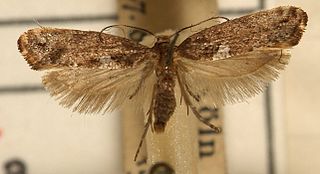
The Acrolepiidae are a family of moths known as false diamondback moths. In modern classifications, they are often treated as a subfamily (Acrolepiinae) of the family Glyphipterigidae.

Metzneria is a genus of moths in the family Gelechiidae, described by Philipp Christoph Zeller in 1839.

Caloptilia populetorum is a moth of the family Gracillariidae. It is found in most of Europe, except Italy, the Balkan Peninsula and the Mediterranean islands.

Elachista pullicomella is a moth of the family Elachistidae. It is found in most of Europe, east into Russia.

Elachista nobilella is a moth of the family Elachistidae found in Europe.
Metalampra is a genus of the concealer moth family (Oecophoridae). Among these, it belongs to subfamily Oecophorinae. It was originally established as a subgenus of Borkhausenia.
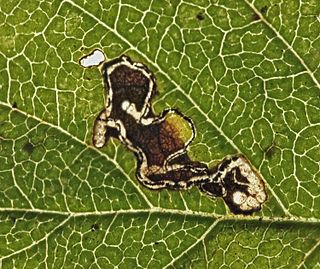
Bucculatrix albedinella is a moth species of the family Bucculatricidae and was first described in 1839 by Philipp Christoph Zeller. It is found in most of Europe.
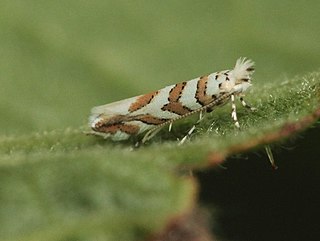
Phyllonorycter kuhlweiniella is a moth of the family Gracillariidae. It is found from Germany to the Iberian Peninsula, Italy and Albania and from Great Britain to central and southern Russia.
Coleophora vibicigerella is a moth of the family Coleophoridae found in Asia, Europe and north Africa. It was first described by Philipp Christoph Zeller in 1839.
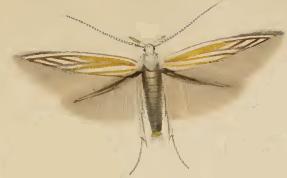
Coleophora currucipennella is a moth of the family Coleophoridae found in Europe. It was first described by Philipp Christoph Zeller in 1839.
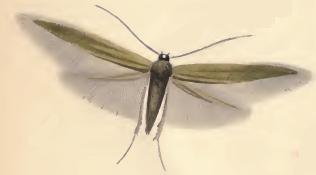
Coleophora paripennella is a moth of the family Coleophoridae. It is found in most of Europe, except the Iberian Peninsula and Balkan Peninsula.
Coleophora vulnerariae is a moth of the family Coleophoridae. It is found from Norway and Sweden to the Iberian Peninsula, Italy and Greece and from Great Britain to the Baltic states, Romania and Bulgaria. It is also found in southern Russia.

Agonopterix conterminella is a moth of the family Depressariidae which is found in Asia, Europe and North America. It was described by Philipp Christoph Zeller in 1839 from a specimen found in Augsburg, Germany. The larvae feed on the terminal shoots of willows.

Agonopterix pallorella is a moth of the family Depressariidae. It is found in most of Europe.

Bucculatrix ulmella is a moth of the family Bucculatricidae. It is found in most of Europe, except the Iberian Peninsula, Slovenia and Bulgaria. It was first described in 1848 by Philipp Christoph Zeller.

Eudonia sudetica is a species of moth in the family Crambidae described by Philipp Christoph Zeller in 1839.
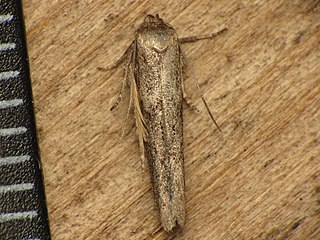
Blastobasis phycidella is a moth in the family Blastobasidae. It is found in most of Europe.

Phaulernis dentella is a moth of the family Epermeniidae found in Asia and Europe. The moth was first described by Philipp Christoph Zeller in 1839.

Phaulernis fulviguttella, the yellow-spotted lance-wing, is a moth of the family Epermeniidae found in the Palearctic including Europe.

Helcystogramma lineolella is a moth of the family Gelechiidae. It was described by Philipp Christoph Zeller in 1839. It is found in most of Europe, except Ireland, Great Britain, the Benelux, the Iberian Peninsula, Italy and the Balkan Peninsula.















